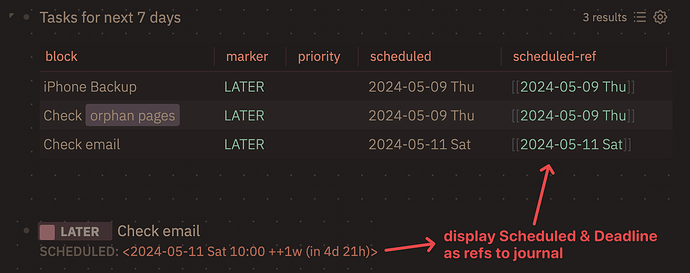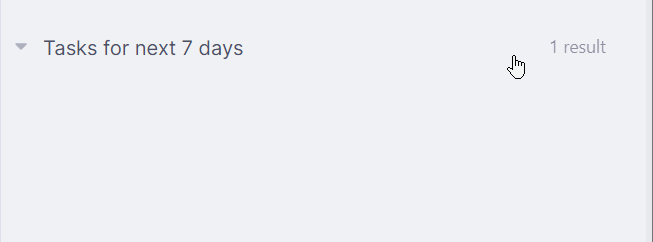Result transform code:
(fn [result]
(def months {1 "January" 2 "February" 3 "March" 4 "April" 5 "May" 6 "June" 7 "July" 8 "August" 9 "September" 10 "October" 11 "November" 12 "December"})
(def monthName (fn [dd]
(get months (int dd))
))
;; source: https://discuss.logseq.com/t/add-query-input-or-function-day-of-week/18361/12
(def days {0 "Saturday" 1 "Sunday" 2 "Monday" 3 "Tuesday" 4 "Wednesday" 5 "Thursday" 6 "Friday"})
(def weekDay (fn [date]
(def month (quot (mod date 10000) 100))
(def month6 (quot (- month 8) 6))
(def year6 (+ (quot date 10000) month6))
(def yearnum (mod year6 100))
(def century (quot year6 100))
(def d (mod (+ (mod date 100) (quot (* 13 (inc (- month (* month6 12)))) 5) yearnum (quot yearnum 4)
(quot century 4) (* 5 century)) 7))
(get days d)
))
(def suffixes {0 "th" 1 "st" 2 "nd" 3 "rd" 4 "th" 5 "th" 6 "th" 7 "th" 8 "th" 9 "th"})
(def positionalSuffix (fn [dd]
(if (or (= dd "11") (= dd "12") (= dd "13"))
(get suffixes 0)
(get suffixes (int (subs dd (count dd) 1))) )
))
(def token (fn [s] (str "⟨" s "⟩")))
(def format
(-> (get (js->clj (call-api "get_user_configs")) "preferredDateFormat")
(clojure.string/replace "do" (token "1"))
(clojure.string/replace "dd" (token "2"))
(clojure.string/replace "d" (token "3"))
(clojure.string/replace "EEEE" (token "4"))
(clojure.string/replace "EEE" (token "5"))
(clojure.string/replace "EE" (token "6"))
(clojure.string/replace "E" (token "7"))
(clojure.string/replace "MMMM" (token "8"))
(clojure.string/replace "MMM" (token "9"))
(clojure.string/replace "MM" (token "10"))
(clojure.string/replace "M" (token "11"))
(clojure.string/replace "yyyy" (token "12"))
(clojure.string/replace "yy" (token "13"))
))
(def parseDate (fn [date]
(if-not date nil
(let [
regex (re-pattern "(\\d{4})(\\d{2})(\\d{2})")
[_ yyyy mm dd] (re-matches regex (str date))
yy (subs yyyy 2 4)
d (str (int dd))
do (str d (positionalSuffix dd))
mmmm (monthName mm)
mmm (subs mmmm 0 3)
m (str (int mm))
eeee (weekDay date)
eee (subs eeee 0 3)
ee (subs eeee 0 2)
e eee
]
(-> format
(clojure.string/replace (token "1") do)
(clojure.string/replace (token "2") dd)
(clojure.string/replace (token "3") d)
(clojure.string/replace (token "4") eeee)
(clojure.string/replace (token "5") eee)
(clojure.string/replace (token "6") ee)
(clojure.string/replace (token "7") e)
(clojure.string/replace (token "8") mmmm)
(clojure.string/replace (token "9") mmm)
(clojure.string/replace (token "10") mm)
(clojure.string/replace (token "11") m)
(clojure.string/replace (token "12") yyyy)
(clojure.string/replace (token "13") yy)
)
)
)
))
(def parseDateRef (fn [date]
(if-not date nil
(str "[[" (parseDate date) "]]")
)
))
(map (fn [x]
(update x :block/properties (fn [u]
(-> u
(assoc :marker (str (get x :block/marker)) )
(assoc :priority (str (get x :block/priority)) )
(assoc :scheduled (parseDate (get x :block/scheduled)) )
(assoc :scheduled-ref (parseDateRef (get x :block/scheduled)) )
(assoc :deadline (parseDate (get x :block/deadline)) )
(assoc :deadline-ref (parseDateRef (get x :block/deadline)) )
(assoc :repeated? (str (get x :block/repeated?)) )
)
))
)
result)
)
5 Likes
With format set as :journal/page-title-format "EEEE, dd.MM.yyyy"
This goes a bit above my head to grasp and debug myself d gets parsed again to 7 in the day name.
Edit: yes actually. if I comment out the line (clojure.string/replace "d" d) the result is correct again. I think the replaces need to be in a proper order?
More edits
Changing the order doesn’t solve this…do MMMM yyyy
It should do 1 replace for each “type” based on which one it is. I dunno how to do so, but it should only try to replace M once.
2 Likes
Ha-ha) this is funny bug)
2 Likes
Perfect. This has been amazing Result transform conditional )
I use :sort-tasks for those tasks that don’t use the conditional collapse… until I change all those queries to return ?has-child in the :find. lol!:sort-tasks-collapsed for everything else.
Full config result-transforms:
;; Advanced queries `:result-transform` function.
;; Transform the query result before displaying it.
:query/result-transforms
{:sort-tasks (fn [result]
(def months {1 "January" 2 "February" 3 "March" 4 "April" 5 "May" 6 "June" 7 "July" 8 "August" 9 "September" 10 "October" 11 "November" 12 "December"})
(def monthName (fn [dd]
(get months (int dd))
))
;; source: https://discuss.logseq.com/t/add-query-input-or-function-day-of-week/18361/12
(def days {0 "Saturday" 1 "Sunday" 2 "Monday" 3 "Tuesday" 4 "Wednesday" 5 "Thursday" 6 "Friday"})
(def weekDay (fn [date]
(def month (quot (mod date 10000) 100))
(def month6 (quot (- month 8) 6))
(def year6 (+ (quot date 10000) month6))
(def yearnum (mod year6 100))
(def century (quot year6 100))
(def d (mod (+ (mod date 100) (quot (* 13 (inc (- month (* month6 12)))) 5) yearnum (quot yearnum 4)
(quot century 4) (* 5 century)) 7))
(get days d)
))
(def suffixes {0 "th" 1 "st" 2 "nd" 3 "rd" 4 "th" 5 "th" 6 "th" 7 "th" 8 "th" 9 "th"})
(def positionalSuffix (fn [dd]
(if (or (= dd "11") (= dd "12") (= dd "13"))
(get suffixes 0)
(get suffixes (int (subs dd (count dd) 1))) )
))
(def token (fn [s] (str "⟨" s "⟩")))
(def format
(-> (get (js->clj (call-api "get_user_configs")) "preferredDateFormat")
(clojure.string/replace "do" (token "1"))
(clojure.string/replace "dd" (token "2"))
(clojure.string/replace "d" (token "3"))
(clojure.string/replace "EEEE" (token "4"))
(clojure.string/replace "EEE" (token "5"))
(clojure.string/replace "EE" (token "6"))
(clojure.string/replace "E" (token "7"))
(clojure.string/replace "MMMM" (token "8"))
(clojure.string/replace "MMM" (token "9"))
(clojure.string/replace "MM" (token "10"))
(clojure.string/replace "M" (token "11"))
(clojure.string/replace "yyyy" (token "12"))
(clojure.string/replace "yy" (token "13"))
))
(def parseDate (fn [date]
(if-not date nil
(let [
regex (re-pattern "(\\d{4})(\\d{2})(\\d{2})")
[_ yyyy mm dd] (re-matches regex (str date))
yy (subs yyyy 2 4)
d (str (int dd))
do (str d (positionalSuffix dd))
mmmm (monthName mm)
mmm (subs mmmm 0 3)
m (str (int mm))
eeee (weekDay date)
eee (subs eeee 0 3)
ee (subs eeee 0 2)
e eee
]
(-> format
(clojure.string/replace (token "1") do)
(clojure.string/replace (token "2") dd)
(clojure.string/replace (token "3") d)
(clojure.string/replace (token "4") eeee)
(clojure.string/replace (token "5") eee)
(clojure.string/replace (token "6") ee)
(clojure.string/replace (token "7") e)
(clojure.string/replace (token "8") mmmm)
(clojure.string/replace (token "9") mmm)
(clojure.string/replace (token "10") mm)
(clojure.string/replace (token "11") m)
(clojure.string/replace (token "12") yyyy)
(clojure.string/replace (token "13") yy)
)
)
)
))
(def parseDateRef (fn [date]
(if-not date nil
(str "[[" (parseDate date) "]]")
)
))
(sort-by
(juxt
(fn [r] (get r :block/priority "W"))
(fn [r] (get r :block/scheduled 99999999))
(fn [r] (get r :block/deadline 99999999))
(fn [r] (get r :block/content))
)
(map (fn [x]
(update x :block/properties (fn [u]
(-> u
(assoc :marker (str (get x :block/marker)) )
(assoc :priority (str (get x :block/priority)) )
(assoc :scheduled (parseDate (get x :block/scheduled)) )
(assoc :scheduled-ref (parseDateRef (get x :block/scheduled)) )
(assoc :deadline (parseDate (get x :block/deadline)) )
(assoc :deadline-ref (parseDateRef (get x :block/deadline)) )
(assoc :repeated? (str (get x :block/repeated?)) )
)
))
)
result) )
)
:sort-tasks-collapsed (fn [result]
(def months {1 "January" 2 "February" 3 "March" 4 "April" 5 "May" 6 "June" 7 "July" 8 "August" 9 "September" 10 "October" 11 "November" 12 "December"})
(def monthName (fn [dd]
(get months (int dd))
))
;; source: https://discuss.logseq.com/t/add-query-input-or-function-day-of-week/18361/12
(def days {0 "Saturday" 1 "Sunday" 2 "Monday" 3 "Tuesday" 4 "Wednesday" 5 "Thursday" 6 "Friday"})
(def weekDay (fn [date]
(def month (quot (mod date 10000) 100))
(def month6 (quot (- month 8) 6))
(def year6 (+ (quot date 10000) month6))
(def yearnum (mod year6 100))
(def century (quot year6 100))
(def d (mod (+ (mod date 100) (quot (* 13 (inc (- month (* month6 12)))) 5) yearnum (quot yearnum 4)
(quot century 4) (* 5 century)) 7))
(get days d)
))
(def suffixes {0 "th" 1 "st" 2 "nd" 3 "rd" 4 "th" 5 "th" 6 "th" 7 "th" 8 "th" 9 "th"})
(def positionalSuffix (fn [dd]
(if (or (= dd "11") (= dd "12") (= dd "13"))
(get suffixes 0)
(get suffixes (int (subs dd (count dd) 1))) )
))
(def token (fn [s] (str "⟨" s "⟩")))
(def format
(-> (get (js->clj (call-api "get_user_configs")) "preferredDateFormat")
(clojure.string/replace "do" (token "1"))
(clojure.string/replace "dd" (token "2"))
(clojure.string/replace "d" (token "3"))
(clojure.string/replace "EEEE" (token "4"))
(clojure.string/replace "EEE" (token "5"))
(clojure.string/replace "EE" (token "6"))
(clojure.string/replace "E" (token "7"))
(clojure.string/replace "MMMM" (token "8"))
(clojure.string/replace "MMM" (token "9"))
(clojure.string/replace "MM" (token "10"))
(clojure.string/replace "M" (token "11"))
(clojure.string/replace "yyyy" (token "12"))
(clojure.string/replace "yy" (token "13"))
))
(def parseDate (fn [date]
(if-not date nil
(let [
regex (re-pattern "(\\d{4})(\\d{2})(\\d{2})")
[_ yyyy mm dd] (re-matches regex (str date))
yy (subs yyyy 2 4)
d (str (int dd))
do (str d (positionalSuffix dd))
mmmm (monthName mm)
mmm (subs mmmm 0 3)
m (str (int mm))
eeee (weekDay date)
eee (subs eeee 0 3)
ee (subs eeee 0 2)
e eee
]
(-> format
(clojure.string/replace (token "1") do)
(clojure.string/replace (token "2") dd)
(clojure.string/replace (token "3") d)
(clojure.string/replace (token "4") eeee)
(clojure.string/replace (token "5") eee)
(clojure.string/replace (token "6") ee)
(clojure.string/replace (token "7") e)
(clojure.string/replace (token "8") mmmm)
(clojure.string/replace (token "9") mmm)
(clojure.string/replace (token "10") mm)
(clojure.string/replace (token "11") m)
(clojure.string/replace (token "12") yyyy)
(clojure.string/replace (token "13") yy)
)
)
)
))
(def parseDateRef (fn [date]
(if-not date nil
(str "[[" (parseDate date) "]]")
)
))
(sort-by
(juxt
(fn [r] (get r :block/priority "W"))
(fn [r] (get r :block/scheduled 99999999))
(fn [r] (get r :block/deadline 99999999))
(fn [r] (get r :block/content))
)
(map (fn [x]
(update x :block/properties (fn [u]
(-> u
(assoc :marker (str (get x :block/marker)) )
(assoc :priority (str (get x :block/priority)) )
(assoc :scheduled (parseDate (get x :block/scheduled)) )
(assoc :scheduled-ref (parseDateRef (get x :block/scheduled)) )
(assoc :deadline (parseDate (get x :block/deadline)) )
(assoc :deadline-ref (parseDateRef (get x :block/deadline)) )
(assoc :repeated? (str (get x :block/repeated?)) )
)
))
)
(for [[collapsed, b] (partition 2 result)]
(assoc b :block/collapsed? collapsed)
)
) )
)
}
Ps. yes I realize one acts on tables and another on lists… but I toggle between the two views a lot I’ve noticed
Edit: updated according to bugfixes
4 Likes
Just made long fix :
return «d», «M» placeholders
add «yy» placeholder
some refactoring for better perfomance
Checked on both your patterns:
do MMMM yyyyEEEE, dd.MM.yyyy
3 Likes
etc
May 6, 2024, 3:10pm
7
This is beautifully useful. Thank you for sharing it.
1 Like
Hi @stdword
I am however wondering what your workflow for this is - do you typically insert this into every daily journal or just do some kind of one-off review each week?
I was thinking of making this a permanent fixture on the bottom of each Journal.
:feature/disable-scheduled-and-deadline-query? true
And then attempted to add this into default queries
:default-queries
{:journals
[{:title ["Tasks for next 7 days"]
:query [:find (pull ?block [*])
:in $ ?start ?next
:where
(or
[?block :block/scheduled ?d]
[?block :block/deadline ?d])
[(> ?d ?start)]
[(< ?d ?next)]
(task ?block #{"NOW", "LATER", "TODO", "DOING"})
]
:inputs [:today :+7d]
:result-transform :add-task-attrs
:collapsed? false
}]
}
But it seems that if and only if the query is in default-queries - it becomes impossible to view table mode. I don’t suppose you know of a way to default the query to table mode?
Cheers
1 Like
etc
May 10, 2024, 10:11am
9
You could use :table-view? true to default to table mode.
This works great as advanced query, thank you
what your workflow for this is?
My workflow is simple: I don’t use this query for myself (because I don’t use Logseq for tasks management), it was just interesting clojure task.
I don’t suppose you know of a way to default the query to table mode?
I only aware of :table-view? true setting, as @etc mentioned.
stdword:
:table-view? true
Hi @etc
Please can you confirm my usage of this is correct?
This seems to cause all the results to be hidden/invisible. I wonder if this is a limitation of default queries, specifically?
Cheers
1 Like
Yes. Default queries don’t support table view.
2 Likes
etc
May 10, 2024, 2:26pm
13
I tested it too and get a similar result. Both @siferiax an you are right it seems, and the feature is unfinished for default queries.
1 Like
@Siferiax , @etc ; thank you both for confirmation.
I have raised a feature request for this.
Cheers.
2 Likes




